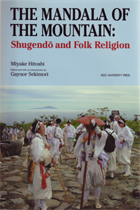| |
 |
THE
MANDALA OF THE MOUNTAIN
Shugendo and Folk Religion
|
|
Author: Miyake Hitoshi
Editor/Author: Gaynor Sekimori
|
 |
Price:
JPY 6,500
Publication date: March 25, 2005
ISBN: 4-7664-1128-5 C3014
Hardcover 230 X 55 200pages |
 |
|
|
 |
|
You can purchase this book also by amazon.co.jp |
|
 Information for
English-Speaking Customers by Amazon.co.jp Information for
English-Speaking Customers by Amazon.co.jp |
|
“Mandala” is a Buddhist word originally meaning “essence of the universe”.
As I have mentioned above, Japanese folk religion considers that deities
dwell in the mountains and the core theme of its festivals is the invitation
of the mountain deity to descend to the village shrine as the protector
of the harvest. As well, villagers looked to religious practitioners who
gained supranormal powers through ascetic practice in the mountains for
spiritual and material help through their magico-religious services. Shugendo
grew up out of this process as a form of mountain religion unique to Japan,
and it has influenced a great number of the new religions that developed
in the nineteenth and twentieth centuries. This volume focuses on Japanese
folk religion and Shugendo as expressions of the essence of Japanese religiosity
and in this sense the term “mandala of the mountain” has been used.
I hope that this work will lead an English-speaking readership to a deeper understanding of Japanese religion and culture and of the Japanese people themselves.
|
| Gaynor Sekimori |
|